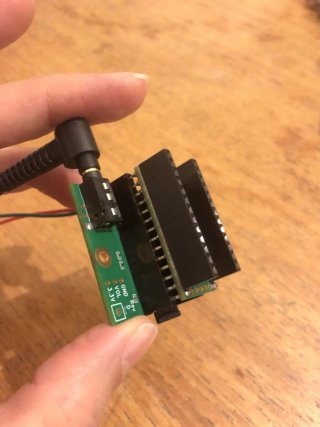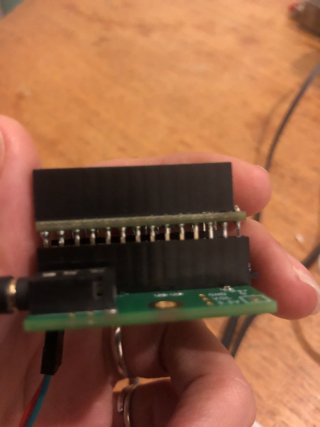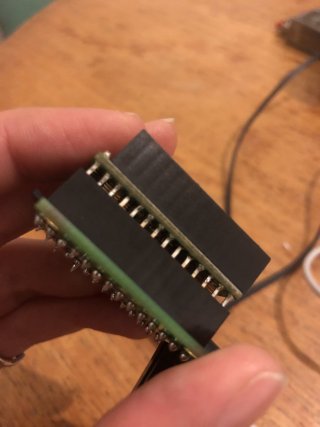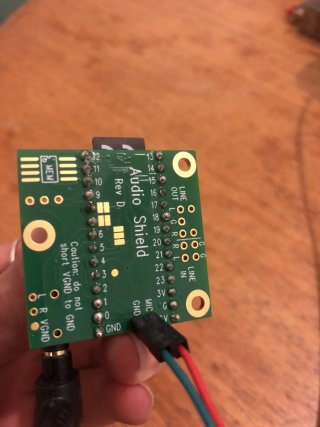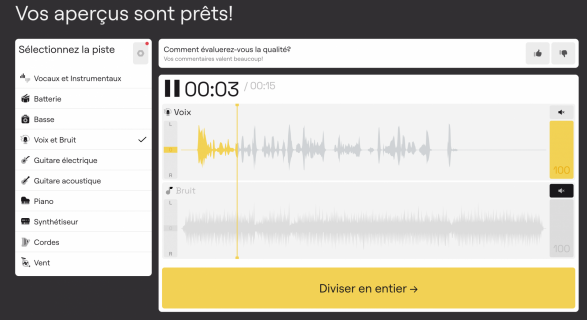Personally, the way i removed the ticking noise from my audio clips was to change to a Teensy 4.1 and use the onboard SD card reader, was much better and super smooth. I also made my own PCB to mount everything to, so the only manual wiring was from handset to screw terminal.Hello folks,
for my wedding on 6th of september this year i want to build us this audio guestbook. I have the basic setup already up and running. Have a greeting and can record messages.
This is the audio quality i'm getting. I've tried replacing the original handset cable with a shielded one and i'm using the AOM5024 mic.SndUp | 00009
Record, upload, share! SndUp is a social network, for audio! We enable you to upload audio clips and share them with the world. Sharing your talent is simple!sndup.net
Is the often mentioned ticking noise which seems to be typical or is this another issue?
This is my code:
Code:/** * Audio Guestbook, Copyright (c) 2022 Playful Technology * * Tested using a Teensy 4.0 with Teensy Audio Shield, although should work * with minor modifications on other similar hardware * * When handset is lifted, a pre-recorded greeting message is played, followed by a tone. * Then, recording starts, and continues until the handset is replaced. * Playback button allows all messages currently saved on SD card through earpiece * * Files are saved on SD card as 44.1kHz, 16-bit, mono signed integer RAW audio format * --> changed this to WAV recording, DD4WH 2022_07_31 * --> added MTP support, which enables copying WAV files from the SD card via the USB connection, DD4WH 2022_08_01 * * * Frank DD4WH, August 1st 2022 * for a DBP 611 telephone (closed contact when handheld is lifted) & with recording to WAV file * contact for switch button 0 is closed when handheld is lifted * * GNU GPL v3.0 license * */ #include <Bounce.h> #include <Audio.h> #include <Wire.h> #include <SPI.h> #include <SD.h> #include <TimeLib.h> #include <MTP_Teensy.h> #include "play_sd_wav.h" // local copy with fixes // DEFINES // Define pins used by Teensy Audio Shield #define SDCARD_CS_PIN 10 #define SDCARD_MOSI_PIN 7 #define SDCARD_SCK_PIN 14 int sd_cs_pin = BUILTIN_SDCARD; // And those used for inputs // Idle value is usually 1, for normally-open // switches connected to a pin with a pullup int HOOK_PIN = 0, HOOK_IDLE = 1; int PLAYBACK_BUTTON_PIN = 1, PLAY_IDLE = 1; // ------------ Audio settings --------- int micgain = 39; float speakervol = 0.5f, beepvol = 0.5f, greetingvol = 0.5f, playvol = 1.0f; int sgtladdr = 0; // ------------------------------------- uint32_t MAX_RECORDING_TIME_MS = 120'000; // limit recordings to this long (milliseconds) #define noINSTRUMENT_SD_WRITE // GLOBALS // Audio initialisation code can be generated using the GUI interface at https://www.pjrc.com/teensy/gui/ // Inputs AudioSynthWaveform waveform1; // To create the "beep" sfx AudioInputI2S i2s2; // I2S input from microphone on audio shield AudioPlaySdWavX playGreeting; // Play 44.1kHz 16-bit PCM greeting WAV file AudioPlaySdWavX playMessage; // Play 44.1kHz 16-bit PCM message WAV file AudioRecordQueue queue1; // Creating an audio buffer in memory before saving to SD AudioMixer4 mixer; // Allows merging several inputs to same output AudioOutputI2S i2s1; // I2S interface to Speaker/Line Out on Audio shield AudioConnection patchCord1(waveform1, 0, mixer, 0); // wave to mixer AudioConnection patchCord2(playGreeting, 0, mixer, 1); // greeting file playback mixer AudioConnection patchCord3(playMessage, 0, mixer, 2); // message file playback mixer AudioConnection patchCord4(mixer, 0, i2s1, 0); // mixer output to speaker (L) AudioConnection patchCord6(mixer, 0, i2s1, 1); // mixer output to speaker (R) AudioConnection patchCord5(i2s2, 0, queue1, 0); // mic input to queue (L) AudioControlSGTL5000 sgtl5000_1; // Filename to save audio recording on SD card char filename[15]; // The file object itself File frec; // Conceal Bounce instances with a wrapper that allows us to // select pin, debounce time and polarity at run-time class BounceZ { int pin = 0; uint32_t debounce = 10; Bounce* bounce = nullptr; int idleLevel; public: void begin(int _pin, uint32_t _debounce, int _idle) { pin = _pin; debounce = _debounce; idleLevel = _idle; if (nullptr != bounce) delete bounce; bounce = new Bounce(pin, debounce); } bool update(void) { return bounce->update(); } bool fallingEdge(void) { bool result; if (1 == idleLevel) result = bounce->fallingEdge(); else result = bounce->risingEdge(); return result; } bool risingEdge(void) { bool result; if (1 == idleLevel) result = bounce->risingEdge(); else result = bounce->fallingEdge(); return result; } bool read(void) { bool result = bounce->read(); if (0 == idleLevel) result = !result; return result; } }; // Use long 40ms debounce time on both switches BounceZ buttonRecord; // = Bounce(HOOK_PIN, 40); BounceZ buttonPlay; // = Bounce(PLAYBACK_BUTTON_PIN, 40); // Keep track of current state of the device enum Mode {Initialising, Ready, Prompting, Recording, Playing}; Mode mode = Mode::Initialising; elapsedMillis theTimer; // used to time out long messages float beep_volume = 0.4f; // not too loud :-) .. but the volume is set in the mixer, really uint32_t MTPcheckInterval; // default value of device check interval [ms] char volname[50] = "Kais Audio guestbook"; // choose a nice name for the SD card volume to appear in your file explorer, or load from gbkcfg.txt // variables for writing to WAV file unsigned long ChunkSize = 0L; unsigned long Subchunk1Size = 16; unsigned int AudioFormat = 1; unsigned int numChannels = 1; unsigned long sampleRate = 44100; unsigned int bitsPerSample = 16; unsigned long byteRate = sampleRate*numChannels*(bitsPerSample/8);// samplerate x channels x (bitspersample / 8) unsigned int blockAlign = numChannels*bitsPerSample/8; unsigned long Subchunk2Size = 0L; unsigned long recByteSaved = 0L; unsigned long NumSamples = 0L; byte byte1, byte2, byte3, byte4; void getSettings(void) { frec = SD.open("gbkcfg.txt"); Serial.println(); if (frec) { char buffer[50]; frec.setTimeout(1); do { int got = frec.readBytesUntil('\n',buffer,sizeof buffer - 1); if (0 == got) break; sscanf(buffer,"hookpin %d",&HOOK_PIN); sscanf(buffer,"hookidle %d",&HOOK_IDLE); sscanf(buffer,"playpin %d",&PLAYBACK_BUTTON_PIN); sscanf(buffer,"playidle %d",&PLAY_IDLE); sscanf(buffer,"micgain %d",&micgain); sscanf(buffer,"speakervol %f",&speakervol); sscanf(buffer,"beepvol %f",&beepvol); sscanf(buffer,"greetingvol %f",&greetingvol); sscanf(buffer,"playvol %f",&playvol); sscanf(buffer,"maxrec %lu",&MAX_RECORDING_TIME_MS); sscanf(buffer,"sgtladdr %d",&sgtladdr); // Try to parse a volume name got = -1; sscanf(buffer,"volname %n",&got); if (got > 0) { strncpy(volname,buffer+got,sizeof volname - 1); for (size_t i = 0; i < sizeof volname; i++) if (volname[i] < 32) { volname[i] = 0; break; } } } while (1); frec.close(); } else Serial.println("No gbkcfg.txt found, using default settings"); Serial.println("Settings:"); Serial.printf("Volume name ''%s''\n",volname); Serial.printf("hookpin %d, idle level %d\n",HOOK_PIN, HOOK_IDLE); Serial.printf("playpin %d, idle level %d\n",PLAYBACK_BUTTON_PIN, PLAY_IDLE); Serial.printf("micgain %d\n",micgain); Serial.printf("speakervol %.2f\n",speakervol); Serial.printf("beepvol %.2f\n",beepvol); Serial.printf("greetingvol %.2f\n",greetingvol); Serial.printf("playvol %.2f\n",playvol); Serial.printf("Max recording length %.3f seconds\n",(float) MAX_RECORDING_TIME_MS/1000.0f); Serial.printf("SGTL5000 address %s\n",sgtladdr?"high":"normal"); Serial.println(); } void setup() { Serial.begin(9600); while (!Serial && millis() < 5000) { // wait for serial port to connect. } print_mode(); Serial.println("Serial set up correctly"); Serial.printf("Audio block set to %d samples\n",AUDIO_BLOCK_SAMPLES); // Initialize the SD card SPI.setMOSI(SDCARD_MOSI_PIN); SPI.setSCK(SDCARD_SCK_PIN); do { sd_cs_pin = BUILTIN_SDCARD; if (SD.begin(sd_cs_pin)) break; Serial.println("No SD card in built-in slot"); delay(250); sd_cs_pin = SDCARD_CS_PIN; if (SD.begin(sd_cs_pin)) break; Serial.printf("No SD card on CS pin %d\n",sd_cs_pin); delay(250); } while (1); Serial.printf("SD card correctly initialized: pin %d\n",sd_cs_pin); getSettings(); // try to read settings from SD card buttonRecord.begin(HOOK_PIN,40,HOOK_IDLE); buttonPlay.begin(PLAYBACK_BUTTON_PIN,40,PLAY_IDLE); // Configure the input pins pinMode(HOOK_PIN, INPUT_PULLUP); pinMode(PLAYBACK_BUTTON_PIN, INPUT_PULLUP); // Audio connections require memory, and the record queue // uses this memory to buffer incoming audio. AudioMemory(60); // Enable the audio shield, select input, and enable output sgtl5000_1.setAddress(sgtladdr); sgtl5000_1.enable(); // Define which input on the audio shield to use (AUDIO_INPUT_LINEIN / AUDIO_INPUT_MIC) sgtl5000_1.inputSelect(AUDIO_INPUT_MIC); //sgtl5000_1.adcHighPassFilterDisable(); // // ----- Level settings ----- sgtl5000_1.micGain(micgain); // set to suit your microphone sgtl5000_1.audioPreProcessorEnable(); // optional: could be a good plan... sgtl5000_1.autoVolumeEnable(); // ...to prevent shouty people overloading the file sgtl5000_1.volume(speakervol); // overall speaker volume mixer.gain(0, beepvol); // beeps mixer.gain(1, greetingvol); // greeting mixer.gain(2, playvol); // message playback // -------------------------- // Play a beep to indicate system is online waveform1.begin(beep_volume, 440, WAVEFORM_SINE); wait(1000); waveform1.amplitude(0); delay(1000); // mandatory to begin the MTP session. MTP.begin(); // Add SD Card // MTP.addFilesystem(SD, "SD Card"); MTP.addFilesystem(SD, volname); Serial.println("Added SD card via MTP"); MTPcheckInterval = MTP.storage()->get_DeltaDeviceCheckTimeMS(); // Value in dB // sgtl5000_1.micGain(15); // sgtl5000_1.micGain(5); // much lower gain is required for the AOM5024 electret capsule // Synchronise the Time object used in the program code with the RTC time provider. // See https://github.com/PaulStoffregen/Time setSyncProvider(getTeensy3Time); // Define a callback that will assign the correct datetime for any file system operations // (i.e. saving a new audio recording onto the SD card) FsDateTime::setCallback(dateTime); mode = Mode::Ready; print_mode(); } void loop() { // First, read the buttons buttonRecord.update(); buttonPlay.update(); switch(mode){ case Mode::Ready: // Falling edge occurs when the handset is lifted --> 611 telephone if (buttonRecord.fallingEdge()) { Serial.println("Handset lifted"); mode = Mode::Prompting; print_mode(); } else if(buttonPlay.fallingEdge()) { //playAllRecordings(); playLastRecording(); } break; case Mode::Prompting: // Wait a second for users to put the handset to their ear wait(1000); // Play the greeting inviting them to record their message playGreeting.play("greeting.wav"); // Wait until the message has finished playing // while (playGreeting.isPlaying()) { while (!playGreeting.isStopped()) { // Check whether the handset is replaced buttonRecord.update(); buttonPlay.update(); // Handset is replaced if (buttonRecord.read()) { // wait() may have lost edge - use the level instead playGreeting.stop(); mode = Mode::Ready; print_mode(); return; } if(buttonPlay.fallingEdge()) { playGreeting.stop(); //playAllRecordings(); playLastRecording(); return; } } // Debug message Serial.println("Starting Recording"); // Play the tone sound effect waveform1.begin(beep_volume, 440, WAVEFORM_SINE); wait(1250); waveform1.amplitude(0); // Start the recording function startRecording(); theTimer = 0; break; case Mode::Recording: // Handset is replaced if ( buttonRecord.risingEdge() || theTimer >= MAX_RECORDING_TIME_MS) // ...or has been off-hook too long) { // Debug log Serial.println("Stopping Recording"); // Stop recording stopRecording(); // Play audio tone to confirm recording has ended end_Beep(); } else { continueRecording(); } break; case Mode::Playing: // to make compiler happy break; case Mode::Initialising: // to make compiler happy break; } MTP.loop(); // This is mandatory to be placed in the loop code. } void setMTPdeviceChecks(bool nable) { if (nable) { MTP.storage()->set_DeltaDeviceCheckTimeMS(MTPcheckInterval); Serial.print("En"); } else { MTP.storage()->set_DeltaDeviceCheckTimeMS((uint32_t) -1); Serial.print("Dis"); } Serial.println("abled MTP storage device checks"); } #if defined(INSTRUMENT_SD_WRITE) static uint32_t worstSDwrite, printNext; #endif // defined(INSTRUMENT_SD_WRITE) void startRecording() { setMTPdeviceChecks(false); // disable MTP device checks while recording #if defined(INSTRUMENT_SD_WRITE) worstSDwrite = 0; printNext = 0; #endif // defined(INSTRUMENT_SD_WRITE) // Find the first available file number // for (uint8_t i=0; i<9999; i++) { // BUGFIX uint8_t overflows if it reaches 255 for (uint16_t i=0; i<9999; i++) { // Format the counter as a five-digit number with leading zeroes, followed by file extension snprintf(filename, 11, " %05d.wav", i); // Create if does not exist, do not open existing, write, sync after write if (!SD.exists(filename)) { break; } } frec = SD.open(filename, FILE_WRITE); Serial.println("Opened file !"); if(frec) { Serial.print("Recording to "); Serial.println(filename); queue1.begin(); mode = Mode::Recording; print_mode(); recByteSaved = 0L; } else { Serial.println("Couldn't open file to record!"); } } void continueRecording() { #if defined(INSTRUMENT_SD_WRITE) uint32_t started = micros(); #endif // defined(INSTRUMENT_SD_WRITE) #define NBLOX 16 // Check if there is data in the queue if (queue1.available() >= NBLOX) { byte buffer[NBLOX*AUDIO_BLOCK_SAMPLES*sizeof(int16_t)]; // Fetch 2 blocks from the audio library and copy // into a 512 byte buffer. The Arduino SD library // is most efficient when full 512 byte sector size // writes are used. for (int i=0;i<NBLOX;i++) { memcpy(buffer+i*AUDIO_BLOCK_SAMPLES*sizeof(int16_t), queue1.readBuffer(), AUDIO_BLOCK_SAMPLES*sizeof(int16_t)); queue1.freeBuffer(); } // Write all 512 bytes to the SD card frec.write(buffer, sizeof buffer); recByteSaved += sizeof buffer; } #if defined(INSTRUMENT_SD_WRITE) started = micros() - started; if (started > worstSDwrite) worstSDwrite = started; if (millis() >= printNext) { Serial.printf("Worst write took %luus\n",worstSDwrite); worstSDwrite = 0; printNext = millis()+250; } #endif // defined(INSTRUMENT_SD_WRITE) } void stopRecording() { // Stop adding any new data to the queue queue1.end(); // Flush all existing remaining data from the queue while (queue1.available() > 0) { // Save to open file frec.write((byte*)queue1.readBuffer(), AUDIO_BLOCK_SAMPLES*sizeof(int16_t)); queue1.freeBuffer(); recByteSaved += AUDIO_BLOCK_SAMPLES*sizeof(int16_t); } writeOutHeader(); // Close the file frec.close(); Serial.println("Closed file"); mode = Mode::Ready; print_mode(); setMTPdeviceChecks(true); // enable MTP device checks, recording is finished } void playAllRecordings() { // Recording files are saved in the root directory File dir = SD.open("/"); while (true) { File entry = dir.openNextFile(); if (strstr(entry.name(), "greeting")) { entry = dir.openNextFile(); } if (!entry) { // no more files entry.close(); end_Beep(); break; } //int8_t len = strlen(entry.name()) - 4; // if (strstr(strlwr(entry.name() + (len - 4)), ".raw")) { // if (strstr(strlwr(entry.name() + (len - 4)), ".wav")) { // the lines above throw a warning, so I replace them with this (which is also easier to read): if (strstr(entry.name(), ".wav") || strstr(entry.name(), ".WAV")) { Serial.print("Now playing "); Serial.println(entry.name()); // Play a short beep before each message waveform1.amplitude(beep_volume); wait(750); waveform1.amplitude(0); // Play the file playMessage.play(entry.name()); mode = Mode::Playing; print_mode(); } entry.close(); // while (playWav1.isPlaying()) { // strangely enough, this works for playRaw, but it does not work properly for playWav while (!playMessage.isStopped()) { // this works for playWav buttonPlay.update(); buttonRecord.update(); // Button is pressed again // if(buttonPlay.risingEdge() || buttonRecord.risingEdge()) { // FIX if(buttonPlay.fallingEdge() || buttonRecord.risingEdge()) { playMessage.stop(); mode = Mode::Ready; print_mode(); return; } } } // All files have been played mode = Mode::Ready; print_mode(); } void playLastRecording() { // Find the first available file number uint16_t idx = 0; for (uint16_t i=0; i<9999; i++) { // Format the counter as a five-digit number with leading zeroes, followed by file extension snprintf(filename, 11, " %05d.wav", i); // check, if file with index i exists if (!SD.exists(filename)) { idx = i - 1; break; } } // now play file with index idx == last recorded file snprintf(filename, 11, " %05d.wav", idx); Serial.println(filename); playMessage.play(filename); mode = Mode::Playing; print_mode(); while (!playMessage.isStopped()) { // this works for playWav buttonPlay.update(); buttonRecord.update(); // Button is pressed again // if(buttonPlay.risingEdge() || buttonRecord.risingEdge()) { // FIX if(buttonPlay.fallingEdge() || buttonRecord.risingEdge()) { playMessage.stop(); mode = Mode::Ready; print_mode(); return; } } // file has been played mode = Mode::Ready; print_mode(); end_Beep(); } // Retrieve the current time from Teensy built-in RTC time_t getTeensy3Time(){ return Teensy3Clock.get(); } // Callback to assign timestamps for file system operations void dateTime(uint16_t* date, uint16_t* time, uint8_t* ms10) { // Return date using FS_DATE macro to format fields. *date = FS_DATE(year(), month(), day()); // Return time using FS_TIME macro to format fields. *time = FS_TIME(hour(), minute(), second()); // Return low time bits in units of 10 ms. *ms10 = second() & 1 ? 100 : 0; } // Non-blocking delay, which pauses execution of main program logic, // but while still listening for input void wait(unsigned int milliseconds) { elapsedMillis msec=0; while (msec <= milliseconds) { buttonRecord.update(); buttonPlay.update(); if (buttonRecord.fallingEdge()) Serial.println("Button (pin 0) Press"); if (buttonPlay.fallingEdge()) Serial.println("Button (pin 1) Press"); if (buttonRecord.risingEdge()) Serial.println("Button (pin 0) Release"); if (buttonPlay.risingEdge()) Serial.println("Button (pin 1) Release"); } } void writeOutHeader() { // update WAV header with final filesize/datasize // NumSamples = (recByteSaved*8)/bitsPerSample/numChannels; // Subchunk2Size = NumSamples*numChannels*bitsPerSample/8; // number of samples x number of channels x number of bytes per sample Subchunk2Size = recByteSaved - 42; // because we didn't make space for the header to start with! Lose 21 samples... ChunkSize = Subchunk2Size + 34; // was 36; frec.seek(0); frec.write("RIFF"); byte1 = ChunkSize & 0xff; byte2 = (ChunkSize >> 8) & 0xff; byte3 = (ChunkSize >> 16) & 0xff; byte4 = (ChunkSize >> 24) & 0xff; frec.write(byte1); frec.write(byte2); frec.write(byte3); frec.write(byte4); frec.write("WAVE"); frec.write("fmt "); byte1 = Subchunk1Size & 0xff; byte2 = (Subchunk1Size >> 8) & 0xff; byte3 = (Subchunk1Size >> 16) & 0xff; byte4 = (Subchunk1Size >> 24) & 0xff; frec.write(byte1); frec.write(byte2); frec.write(byte3); frec.write(byte4); byte1 = AudioFormat & 0xff; byte2 = (AudioFormat >> 8) & 0xff; frec.write(byte1); frec.write(byte2); byte1 = numChannels & 0xff; byte2 = (numChannels >> 8) & 0xff; frec.write(byte1); frec.write(byte2); byte1 = sampleRate & 0xff; byte2 = (sampleRate >> 8) & 0xff; byte3 = (sampleRate >> 16) & 0xff; byte4 = (sampleRate >> 24) & 0xff; frec.write(byte1); frec.write(byte2); frec.write(byte3); frec.write(byte4); byte1 = byteRate & 0xff; byte2 = (byteRate >> 8) & 0xff; byte3 = (byteRate >> 16) & 0xff; byte4 = (byteRate >> 24) & 0xff; frec.write(byte1); frec.write(byte2); frec.write(byte3); frec.write(byte4); byte1 = blockAlign & 0xff; byte2 = (blockAlign >> 8) & 0xff; frec.write(byte1); frec.write(byte2); byte1 = bitsPerSample & 0xff; byte2 = (bitsPerSample >> 8) & 0xff; frec.write(byte1); frec.write(byte2); frec.write("data"); byte1 = Subchunk2Size & 0xff; byte2 = (Subchunk2Size >> 8) & 0xff; byte3 = (Subchunk2Size >> 16) & 0xff; byte4 = (Subchunk2Size >> 24) & 0xff; frec.write(byte1); frec.write(byte2); frec.write(byte3); frec.write(byte4); frec.close(); Serial.println("header written"); Serial.print("Subchunk2: "); Serial.println(Subchunk2Size); } void end_Beep(void) { waveform1.frequency(523.25); waveform1.amplitude(beep_volume); wait(250); waveform1.amplitude(0); wait(250); waveform1.amplitude(beep_volume); wait(250); waveform1.amplitude(0); wait(250); waveform1.amplitude(beep_volume); wait(250); waveform1.amplitude(0); wait(250); waveform1.amplitude(beep_volume); wait(250); waveform1.amplitude(0); } void print_mode(void) { // only for debugging Serial.print("Mode switched to: "); // Initialising, Ready, Prompting, Recording, Playing if(mode == Mode::Ready) Serial.println(" Ready"); else if(mode == Mode::Prompting) Serial.println(" Prompting"); else if(mode == Mode::Recording) Serial.println(" Recording"); else if(mode == Mode::Playing) Serial.println(" Playing"); else if(mode == Mode::Initialising) Serial.println(" Initialising"); else Serial.println(" Undefined"); }
Thanks!
Happy to share files, although time running out to get this ready for the 6th!


